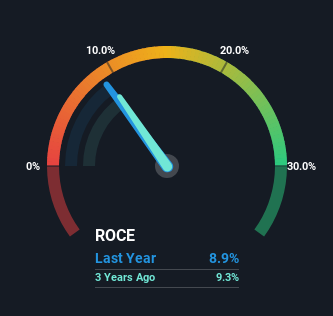Bellway (LON:BWY) Will Want To Turn Around Its Return Trends
If we want to find a stock that could multiply over the long term, what are the underlying trends we should look for? Ideally, a business will show two trends; firstly a growing return on capital employed (ROCE) and secondly, an increasing amount of capital employed. Basically this means that a company has profitable initiatives that it can continue to reinvest in, which is a trait of a compounding machine. Although, when we looked at Bellway (LON:BWY), it didn't seem to tick all of these boxes.
What Is Return On Capital Employed (ROCE)?
For those that aren't sure what ROCE is, it measures the amount of pre-tax profits a company can generate from the capital employed in its business. Analysts use this formula to calculate it for Bellway:
Return on Capital Employed = Earnings Before Interest and Tax (EBIT) ÷ (Total Assets - Current Liabilities)
0.089 = UK£362m ÷ (UK£4.9b - UK£833m) (Based on the trailing twelve months to January 2024).
Therefore, Bellway has an ROCE of 8.9%. On its own that's a low return on capital but it's in line with the industry's average returns of 9.5%.
Check out our latest analysis for Bellway
Above you can see how the current ROCE for Bellway compares to its prior returns on capital, but there's only so much you can tell from the past. If you'd like, you can check out the forecasts from the analysts covering Bellway for free.
The Trend Of ROCE
When we looked at the ROCE trend at Bellway, we didn't gain much confidence. Over the last five years, returns on capital have decreased to 8.9% from 24% five years ago. Given the business is employing more capital while revenue has slipped, this is a bit concerning. If this were to continue, you might be looking at a company that is trying to reinvest for growth but is actually losing market share since sales haven't increased.
The Bottom Line
From the above analysis, we find it rather worrisome that returns on capital and sales for Bellway have fallen, meanwhile the business is employing more capital than it was five years ago. Investors must expect better things on the horizon though because the stock has risen 15% in the last five years. Regardless, we don't like the trends as they are and if they persist, we think you might find better investments elsewhere.
If you want to continue researching Bellway, you might be interested to know about the 1 warning sign that our analysis has discovered.
While Bellway may not currently earn the highest returns, we've compiled a list of companies that currently earn more than 25% return on equity. Check out this free list here.
Have feedback on this article? Concerned about the content? Get in touch with us directly. Alternatively, email editorial-team (at) simplywallst.com.
This article by Simply Wall St is general in nature. We provide commentary based on historical data and analyst forecasts only using an unbiased methodology and our articles are not intended to be financial advice. It does not constitute a recommendation to buy or sell any stock, and does not take account of your objectives, or your financial situation. We aim to bring you long-term focused analysis driven by fundamental data. Note that our analysis may not factor in the latest price-sensitive company announcements or qualitative material. Simply Wall St has no position in any stocks mentioned.
Have feedback on this article? Concerned about the content? Get in touch with us directly. Alternatively, email editorial-team@simplywallst.com

 Yahoo Finance
Yahoo Finance 
